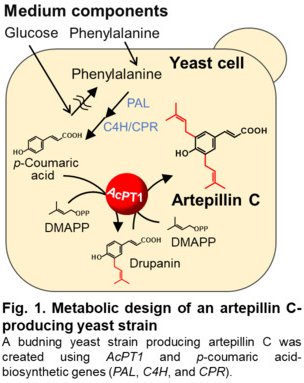Presenter: Ryosuke MUNAKATA (Assistant Professor, RISH, Kyoto University)
Title: Metabolic engineering of yeast for production of artepillin C, a plant-derived bioactive compound in Brazilian green propolis
Place: Online
Associated Mission: Mission 5 (Quality of the Future Humanosphere)
If you would like to participate, please e-mail me your name, affiliation and e-mail address by 10 am on the day.
(Open Seminar Office: rish-center_events@rish.kyoto-u.ac.jp)
Abstract
Plant-derived metabolites have enriched human life as medicines, nutrients, pigments and so on. Estimations say that plants produce 200,000–1,000,000 kinds of metabolites, many of which are remained to be exploited due to their low and variable quantities in nature. To overcome such problems, recently synthetic biology-based production of plant bioactive molecules in microorganisms has been rapidly developing.
Propolis is a resinous honeybee product showing a variety of bioactivities such as anti-obesity and anti-oxidation effects, which are exerted by metabolites derived from plant tissues which honeybees collect in propolis production. However, the concentrations of such bioactive metabolites are highly variable by various natural factors such as the conditions of plants and the performance of honeybees, being a serious problem of quality control of propolis and related products. Artepillin C is a main bioactive ingredient in Brazilian green propolis that is one of the most major propolis type and globally commercialized.

In this study, we tried synthetic biological production of artepillin C in budding yeast using biosynthetic genes of this molecule (Munakata et al., Commun. Biol. 2019). First, we performed identification of (a) gene(s) responsible for the prenylation reactions of p-coumaric acid, which have been genetically unrevealed so far. A transcriptomic approach of Artemisia capillaris (Kawara-yomogi in Japanese), an Asteraceae medicinal plant species accumulating artepillin C, found a prenyltransferase (PT) gene, AcPT1. Biochemical analysis indicated that this gene product catalyzes the stepwise transfer of two prenyl moieties to p-coumaric acid to yield artepillin C. AcPT1 and p-coumaric acid biosynthetic genes were co-expressed in a budding yeast strain, resulting in production of artepillin C (Fig. 1). Optimization of this production system would enable a stable supply of the valuable molecule in the future.
PDF file (165 175 bytes) | Top
9 October, 2020


